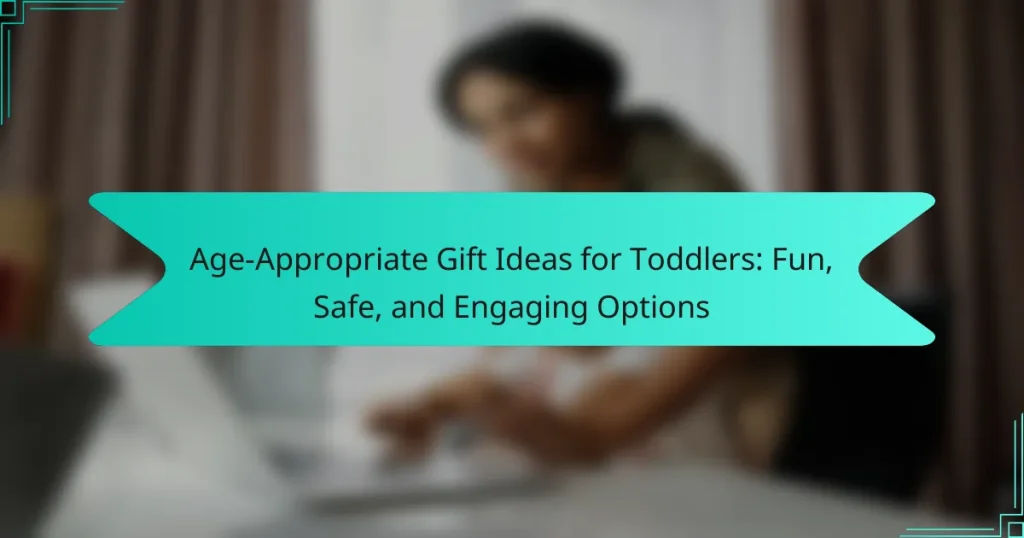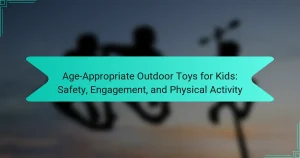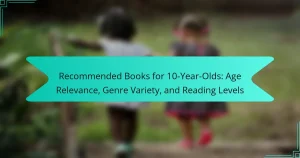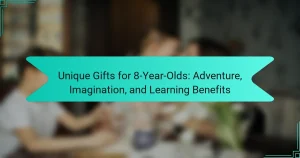Age-appropriate gift ideas for toddlers focus on toys that promote learning and development. Key options include building blocks for enhancing motor skills, soft stuffed animals for comfort and imaginative play, board books for language development, and musical instruments for auditory skills. Safety is paramount, with recommendations to choose non-toxic, durable items that meet safety standards and avoid choking hazards. Popular choices also encompass educational toys, puzzles, and art supplies that foster creativity and problem-solving abilities, ensuring that gifts are both engaging and beneficial for toddlers’ growth.
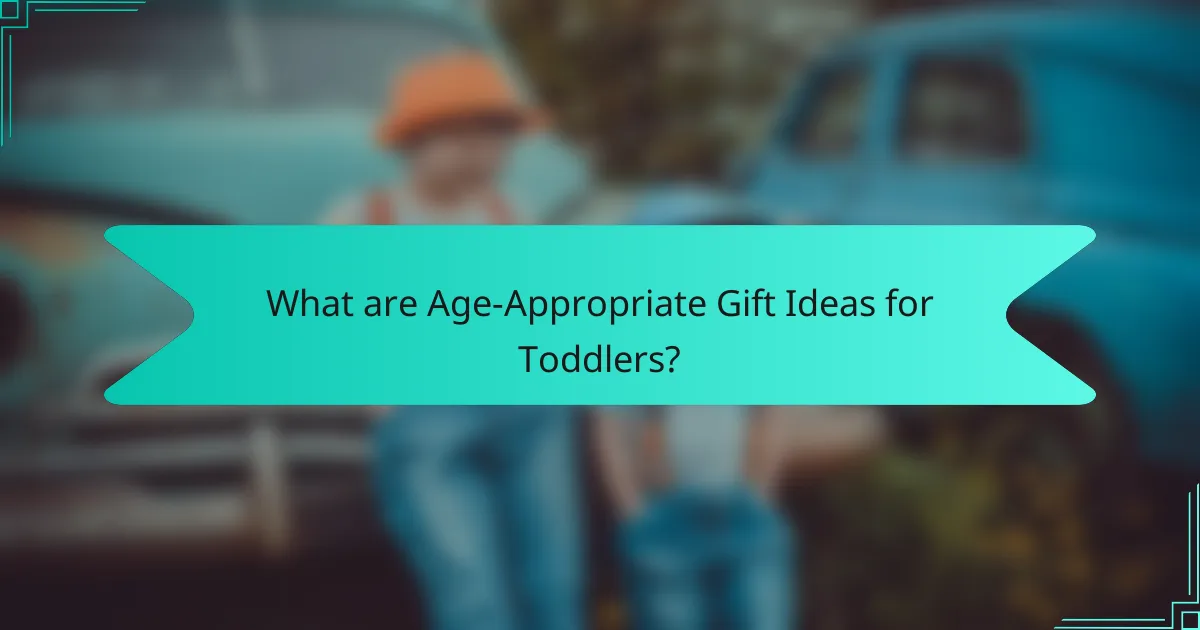
What are Age-Appropriate Gift Ideas for Toddlers?
Age-appropriate gift ideas for toddlers include toys that promote learning and development. Examples are building blocks, which enhance motor skills and creativity. Soft stuffed animals can provide comfort and encourage imaginative play. Board books with colorful pictures support language development and early literacy. Musical instruments, like maracas or xylophones, foster auditory skills and rhythm. Puzzles with large pieces help develop problem-solving abilities. Art supplies, such as crayons and washable markers, encourage creativity and fine motor skills. These gifts are safe and engaging for toddlers, aligning with their developmental needs.
Why is it important to choose age-appropriate gifts for toddlers?
Choosing age-appropriate gifts for toddlers is crucial for their safety and development. Toddlers have specific developmental milestones that influence their ability to interact with toys. Age-appropriate gifts ensure that toys are safe, without small parts that pose choking hazards. They also support cognitive and motor skill development suited to a toddler’s abilities. For instance, toys designed for toddlers often encourage imaginative play and problem-solving skills. According to the American Academy of Pediatrics, toys should match a child’s developmental stage to promote learning and avoid frustration. Selecting the right gifts fosters a positive play experience, enhancing learning outcomes.
What developmental milestones should be considered when selecting gifts?
When selecting gifts for toddlers, consider their developmental milestones. These milestones include physical, cognitive, social, and emotional development. Physical milestones involve fine and gross motor skills, such as grasping and walking. Cognitive milestones focus on problem-solving and understanding cause and effect. Social milestones encompass interaction with peers and adults, fostering sharing and communication. Emotional milestones relate to self-regulation and expressing feelings. Research shows that toys aligned with these milestones enhance learning and development. For instance, stacking blocks support fine motor skills and cognitive understanding. Gifts that promote these areas can significantly contribute to a toddler’s growth.
How do age recommendations influence gift safety?
Age recommendations significantly influence gift safety by ensuring that toys and products are suitable for a child’s developmental stage. These guidelines help prevent accidents and injuries associated with inappropriate items. For example, toys with small parts pose choking hazards for younger children. The American Academy of Pediatrics emphasizes the importance of age-appropriate toys to enhance safety and developmental benefits. Studies indicate that adhering to age recommendations reduces the risk of injury in children. Therefore, age recommendations serve as essential criteria for selecting safe gifts for toddlers.
What types of gifts are suitable for toddlers?
Suitable gifts for toddlers include educational toys, plush animals, and building blocks. Educational toys promote cognitive development and fine motor skills. Plush animals provide comfort and imaginative play opportunities. Building blocks enhance spatial awareness and creativity. Other options include art supplies for creative expression and musical instruments for auditory development. Books with colorful illustrations foster language skills and early literacy. These types of gifts are designed to be safe and engaging for toddlers, ensuring they support developmental milestones.
What are the best toys for sensory development?
The best toys for sensory development include items that stimulate the five senses. Examples are textured balls, musical instruments, and sensory bins filled with various materials. Textured balls provide tactile stimulation and improve grip strength. Musical instruments encourage auditory exploration and rhythm recognition. Sensory bins allow children to explore different textures and materials, enhancing fine motor skills. Additionally, toys like light-up blocks engage visual senses while promoting imaginative play. Research indicates that sensory play supports cognitive and emotional development in toddlers. Engaging with these toys can lead to improved sensory processing skills.
How can educational gifts enhance learning in toddlers?
Educational gifts enhance learning in toddlers by promoting cognitive development and skill acquisition. These gifts often include puzzles, building blocks, and interactive books. Such items stimulate problem-solving abilities and critical thinking skills. Research shows that hands-on learning activities improve retention and understanding. For instance, a study by the American Academy of Pediatrics highlights that play-based learning significantly boosts early literacy and numeracy. Engaging with educational gifts also fosters creativity and social skills through cooperative play. Overall, these gifts provide a foundation for lifelong learning.

How do you ensure the safety of gifts for toddlers?
To ensure the safety of gifts for toddlers, select items that meet safety standards. Look for toys labeled as non-toxic and age-appropriate. Check for small parts that could pose choking hazards. Avoid gifts with sharp edges or small components. Review product recalls to ensure the item is safe. Choose gifts that are durable and can withstand rough play. Opt for soft materials to prevent injuries. Verify that the gift has passed safety testing guidelines.
What safety standards should gifts meet?
Gifts should meet safety standards such as ASTM F963 and CPSIA regulations. ASTM F963 outlines safety specifications for toys, ensuring they are free from hazardous materials and sharp edges. CPSIA mandates limits on lead and phthalates in children’s products. Compliance with these standards helps prevent choking hazards and toxic exposure. Products should also carry appropriate labeling for age recommendations. Testing by certified laboratories verifies adherence to these safety standards. Regular updates to safety regulations ensure ongoing protection for children.
How can parents identify choking hazards in toys?
Parents can identify choking hazards in toys by checking for small parts. Toys with parts smaller than 1.25 inches in diameter pose a choking risk. The American Academy of Pediatrics advises using the “toilet paper roll test.” If a toy fits inside a standard toilet paper roll, it is a potential choking hazard. Parents should also inspect toys for loose pieces or breakable components. Age recommendations on toy packaging provide guidance on safety. Parents should avoid toys with small balls or marbles for young children. Regularly reviewing toys for wear and tear helps ensure safety.
What materials are safest for toddler toys?
The safest materials for toddler toys include wood, silicone, and BPA-free plastics. Wood toys are durable and often made from non-toxic finishes. Silicone is soft, flexible, and free from harmful chemicals. BPA-free plastics ensure that toys do not contain bisphenol A, a harmful substance. Additionally, organic cotton is safe for soft toys and dolls. These materials are preferred due to their non-toxic nature and safety for young children. Research has shown that toys made from these materials pose minimal risk of injury or exposure to harmful substances.
Why is engagement important in gift selection?
Engagement is important in gift selection because it enhances the recipient’s enjoyment and interaction with the gift. When a gift is engaging, it captures attention and encourages exploration. This is especially crucial for toddlers, as their development benefits from active play and stimulation. Engaging gifts promote cognitive skills, creativity, and social interaction. Research shows that toys designed for engagement can improve motor skills and problem-solving abilities in young children. Therefore, selecting gifts that foster engagement is essential for supporting toddlers’ growth and learning.
How do interactive toys promote cognitive skills?
Interactive toys promote cognitive skills by engaging children in active learning experiences. These toys often incorporate problem-solving tasks that stimulate critical thinking. For example, puzzles require children to identify shapes and develop spatial awareness. Additionally, interactive toys frequently use sounds, colors, and textures to enhance sensory experiences. This multisensory approach encourages exploration and curiosity. Research indicates that play-based learning significantly boosts cognitive development in early childhood. A study published in the journal “Child Development” shows that children who engage with interactive toys demonstrate improved memory and attention skills. Overall, interactive toys facilitate essential cognitive growth through hands-on play and exploration.
What role does imaginative play have in toddler development?
Imaginative play is crucial for toddler development. It fosters creativity and problem-solving skills. Through imaginative play, toddlers explore different roles and scenarios. This exploration enhances their social skills and emotional understanding. Engaging in pretend play helps toddlers learn to express their feelings. Research indicates that imaginative play supports cognitive development. A study by the American Academy of Pediatrics highlights its importance in learning. Imaginative play also encourages language development as toddlers narrate their stories. Overall, it plays a significant role in holistic growth during early childhood.

What are some popular gift ideas for toddlers?
Popular gift ideas for toddlers include educational toys, books, and art supplies. Educational toys like building blocks enhance motor skills and creativity. Books with colorful illustrations promote language development and imagination. Art supplies such as crayons and coloring books encourage self-expression. Puzzles improve problem-solving abilities and hand-eye coordination. Stuffed animals provide comfort and companionship. Musical instruments introduce rhythm and sound exploration. These gifts are engaging, safe, and beneficial for toddlers’ growth and development.
What are the top trending toys for toddlers this year?
The top trending toys for toddlers this year include interactive learning toys, building blocks, and sensory play items. Interactive learning toys like tablets designed for toddlers engage children with educational games. Building blocks promote creativity and fine motor skills through hands-on play. Sensory play items, such as textured balls or water play kits, stimulate tactile exploration. These toys have been recognized by industry experts for their developmental benefits. According to the Toy Association’s annual report, these categories are highly sought after in 2023.
What classic toys have stood the test of time for toddlers?
Classic toys that have stood the test of time for toddlers include building blocks, wooden toys, and dolls. Building blocks, such as LEGO Duplo, promote creativity and fine motor skills. Wooden toys, like stacking rings and shape sorters, enhance cognitive development. Dolls encourage imaginative play and social skills. These toys have been popular for decades due to their educational value and durability. Research indicates that open-ended toys foster creativity and problem-solving in young children. The American Academy of Pediatrics supports the use of such toys for healthy development.
How can parents personalize gifts for toddlers?
Parents can personalize gifts for toddlers by selecting items that reflect the child’s interests and personality. This can include choosing toys that feature the child’s favorite characters or themes. Customizing gifts with the child’s name can also add a personal touch. For example, personalized storybooks or blankets that feature the child’s name create a unique connection. Additionally, parents can opt for handmade gifts that incorporate personal elements, such as a photo album filled with family pictures. Research shows that personalized gifts can enhance emotional connections and foster a sense of belonging in young children.
What are some unique gift ideas that can be customized?
Personalized storybooks are unique gift ideas that can be customized for toddlers. These books include the child’s name and details, making them special. Customized puzzles with the child’s name or favorite characters are also unique. They provide both entertainment and learning opportunities. Personalized stuffed animals can be embroidered with the child’s name, adding a special touch. Custom-made blankets featuring favorite colors or characters are another thoughtful option. Engraved wooden toys can be tailored with names or special messages. Unique art kits that allow for personalized creations are engaging and fun. Each of these gifts offers a personal connection, making them memorable for toddlers.
How does personalization enhance a toddler’s play experience?
Personalization enhances a toddler’s play experience by making activities more engaging and meaningful. When toys and games are tailored to a child’s interests, they are more likely to participate actively. Personalized items can include a child’s name, favorite colors, or themes they enjoy. Research shows that personalized play can boost a child’s confidence and emotional connection to their toys. For instance, a study by the University of Cambridge found that children engage longer with toys that reflect their personal identity. This leads to improved cognitive and social skills as they explore and interact with their environment. Overall, personalization fosters a sense of ownership and joy in play.
What are some tips for selecting the perfect gift for a toddler?
Choose gifts that are age-appropriate for toddlers. Consider toys that promote physical, cognitive, and emotional development. Look for items that are safe and non-toxic. Ensure the gift does not have small parts that could be a choking hazard. Select toys that encourage imaginative play, such as building blocks or role-play sets. Opt for gifts that are durable and can withstand rough handling. Research indicates that interactive toys enhance learning and engagement. According to the American Academy of Pediatrics, selecting the right toys can positively influence a toddler’s growth and development.
Age-Appropriate Gift Ideas for Toddlers focuses on selecting safe and engaging toys that support toddlers’ developmental milestones. The article outlines various gift categories, including educational toys, plush animals, and art supplies, emphasizing their role in enhancing cognitive, physical, and social skills. It highlights the importance of safety standards and age recommendations to prevent hazards, as well as the benefits of imaginative and interactive play. Additionally, the piece provides tips for personalizing gifts and ensuring they align with a child’s interests, ultimately fostering a positive and enriching play experience.
